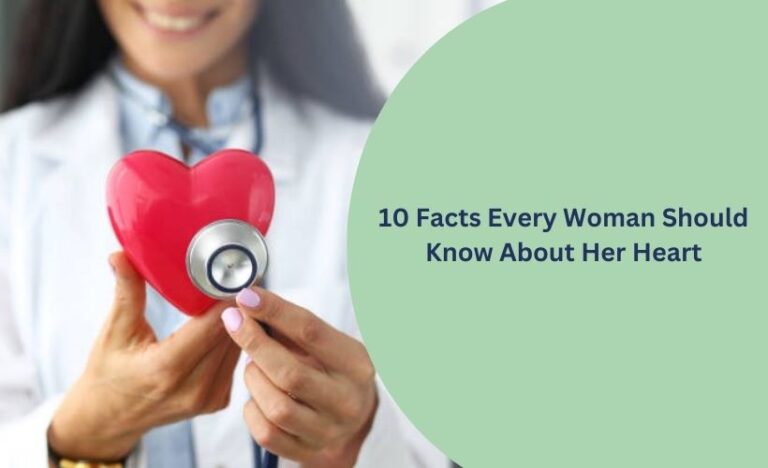10 Facts Every Woman Should Know About Her Heart
As women, we often put others first and forget to care for ourselves, but we must prioritize our health. Heart disease is the number one killer of women, causing one in three deaths each year. Despite common misconceptions, heart disease is the leading cause of death among women worldwide, surpassing even breast cancer. However, by knowing the facts, we can take steps to reduce our risk and stay healthy. Here are the top 10 facts every woman should know about her heart:

Fact #1: Women's Heart Beats Fast
On average, a woman’s heartbeat is about 8 beats per minute faster than a man’s. Women tend to have smaller hearts and faster heart rates to compensate. However, this doesn’t necessarily mean that women are at a higher risk for heart disease.
Women’s hearts are more efficient than men’s, pumping more blood with each beat. This is because women’s hearts are adapted to support the needs of a growing fetus during pregnancy. However, this also means that women may experience more heart palpitations and arrhythmias than men.
Fact #2: Symptoms of Heart Disease Differ in Women
Women often experience different symptoms of a heart attack than men. While chest pain is common, women may also have symptoms such as nausea, fatigue, shortness of breath, and pain in the jaw, neck, back, or abdomen.
Fact #3: Pregnancy problems can lead to a higher chance of heart disease
Pregnancy complications like pre-eclampsia or gestational diabetes can increase your risk of heart disease later in life. Talk to your doctor about any pregnancy concerns and get screened for potential risks after childbirth.
Fact# 4: Menopause can impact Women's heart health
Menopause brings significant hormonal changes, particularly a decrease in estrogen levels, which can negatively affect heart health. Estrogen helps protect the heart by maintaining healthy blood vessels and cholesterol levels. As estrogen levels drop, women face an increased risk of developing heart disease, high blood pressure, and higher cholesterol.
Fact#5: Heart attack symptoms can be different for women
Heart attack symptoms can be different for women. They may include:
- Uncomfortable pressure, squeezing, fullness, or pain in the center of your chest
- Pain or discomfort in one or both arms, the back, neck, jaw, or stomach
- Shortness of breath with or without chest discomfort
- Other signs such as breaking out in a cold sweat, nausea, or lightheadedness
Fact #6: Women's Hearts are Different
Women’s hearts are different from men’s in certain ways, which can affect the way women develop heart disease and experience heart attack symptoms. For example, women are more likely to experience heart attack symptoms such as:
- Shortness of breath
- Nausea and vomiting
- Pain in the arm, neck, or jaw
- Fatigue
- Palpitations
Women are also more likely to develop heart disease later in life, often after menopause. This is because estrogen, a hormone that helps to protect the heart, decreases after menopause.
Fact #7: Heart Disease is the Leading Cause of Death Among Women
Contrary to popular belief, heart disease is the number one killer of women globally. It surpasses all forms of cancer combined. Despite common misconceptions that heart disease primarily affects men, it poses a significant threat to women. Factors such as delayed recognition of symptoms, unique risk factors like hormonal changes and pregnancy complications, and disparities in healthcare access contribute to this sobering statistic.
Fact #8: Risk Factors Can Vary Between Men and Women
Women may have unique risk factors such as pregnancy complications, autoimmune diseases like lupus, and hormonal changes that impact heart health. Understanding these factors helps in proactive management.
Fact#9: Heart Disease Awareness Among Women is Lower
Despite being the leading cause of death for women, awareness about heart disease symptoms, risk factors, and preventive measures remains lower compared to men. Education and outreach efforts are crucial in closing this knowledge gap.
Fact #10: Using birth control can impact heart health
Using birth control can impact heart health due to its influence on hormone levels and cardiovascular risk factors. Hormonal contraceptives, such as birth control pills, patches, and hormonal intrauterine devices (IUDs), can affect cholesterol levels, blood pressure, and the likelihood of blood clot formation. While the overall risk remains low for most women, those with pre-existing conditions like hypertension or diabetes may face higher risks. It’s important for women considering birth control to discuss their medical history and potential cardiovascular risks with a healthcare provider to make informed choices that prioritize heart health.
Warning: Trying to access array offset on value of type null in /home/u995397347/domains/vedaworldhealthcare.com/public_html/wp-content/plugins/elementor/includes/widgets/video.php on line 1199

